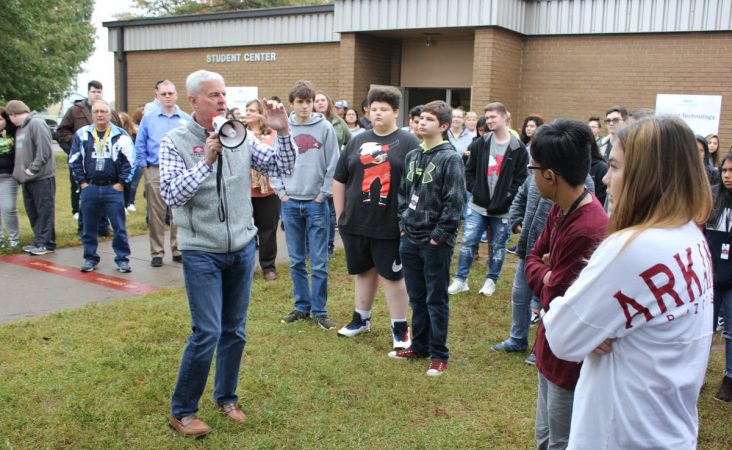Rep. Steve Womack, area businesses encourage students to consider technical career
by October 26, 2018 4:51 pm 816 views

U.S. Rep. Steve Womack, R-Rogers, speaks Friday to nearly 1,000 students from high schools in Washington, Benton and Madison counties.
U.S. Rep. Steve Womack, R-Rogers, encouraged nearly 1,000 students from Northwest Arkansas high schools and Springdale-based Northwest Technical Institute (NWTI) to seek a technical education.
Womack spoke to the students Friday (Oct. 26) at NWTI in a manufacturing day event and open house that included 32 businesses with needs to fill thousands of skilled labor positions. NWTI has hosted the open house event for five years and manufacturing day for three years. The events have since been combined.
Demand for skilled labor jobs is expected to rise, and NWTI offers the training for those jobs, Womack said. In August, the technical school announced its ammonia refrigeration program will be one of only a handful of nationally accredited training programs in the United States after the existing program is expanded. The $3.5 million expansion will add a 19,000-square-foot building adjacent to the existing facility on campus where the program is offered.
NWTI President Blake Robertson said he expects construction on the new facility to start by the end of the year. The plan is for the new facility to open in fall 2020, and it will allow the school to offer professional development training and triple the number of students in the program, which has about 25.
Also, NWTI is expected to start construction by the end of the year on a 13,000-square-foot building that will house the welding program, which is in a 5,000-square-foot building on campus, Robertson said. The larger facility will allow the school to train up to 40 students annually, up from 18-20 students. The project is being paid for with a private donation from a Springdale family.
Robertson said the events Friday give students an opportunity to see that college isn’t the only path into a career. Most of the training programs the technical school offers can be completed in one year and for about $6,000.
Those who receive the technical training in high school or at a technical school can earn the training needed to find a good paying job but without a large amount of college debt, Womack said.
“Because of the number and types of jobs that do not require that formal education but do carry with it certain credentials or certifications that across the entire spectrum of manufacturing there is a huge demand for the kind of talent that a technical institute like this is catering to,” he said. “In most of the cases here if you can complete a course of study on, say, automotive or diesel or welding or nurse technicians, if you can get to a program like this and come out with a certification, I would say the job placement opportunity there is well over 90% and in some cases 100%. There are just not enough people with these kinds of skills.”
He also said the workplace conditions for those who work in manufacturing positions have improved and most of the facilities are climate controlled, have new technology and use robotics.
When asked about the progress the state has made to meet the demand for skilled labor positions, Womack said it’s better but more can be done. He said a number of programs have been established to train students at an earlier age; however, the state needs to focus on facilities to house these programs, offer up-to-date equipment and develop educators who will train the next generation.
Mike Rogers, senior director of maintenance and refrigeration at Springdale-based meat producer Tyson Foods, said he established the first industrial maintenance pre-apprenticeship program in Arkansas in 2014. At the time, he was working for Siloam Springs School District, and the program allowed his students to complete four years of a nationally accredited pre-apprenticeship while in school.
Rogers, who went on to work as a consultant for Tyson helping to set up technical schools near company locations, said it has 1,450 skilled labor positions that need to be filled nationwide, and 60% of technicians are at least 50 years old. Students, who are at least 18, can work while continuing to receive training to advance their careers. Some of the technical careers that Tyson offers includes industrial maintenance, ammonia refrigeration and robotics tech. The average salary related to those positions is $43,442, $48,938 and $86,985, respectively, according to Tyson Foods.
